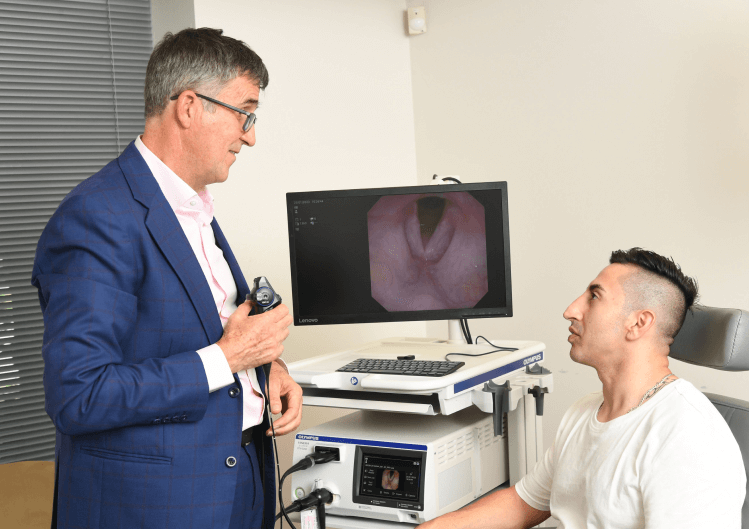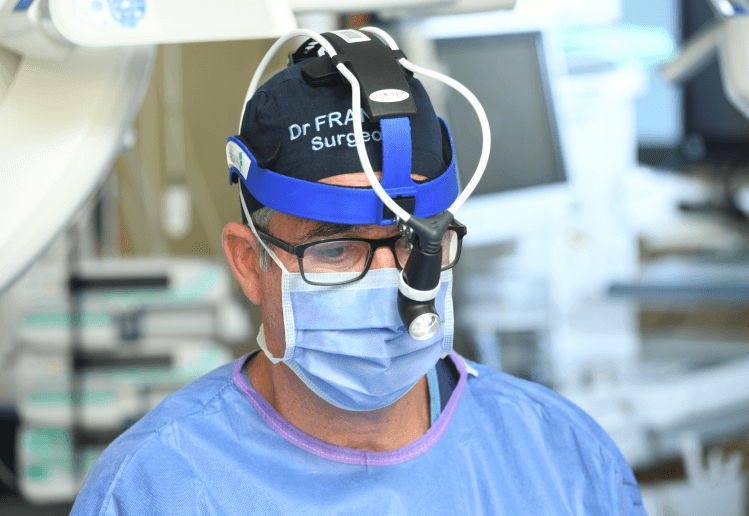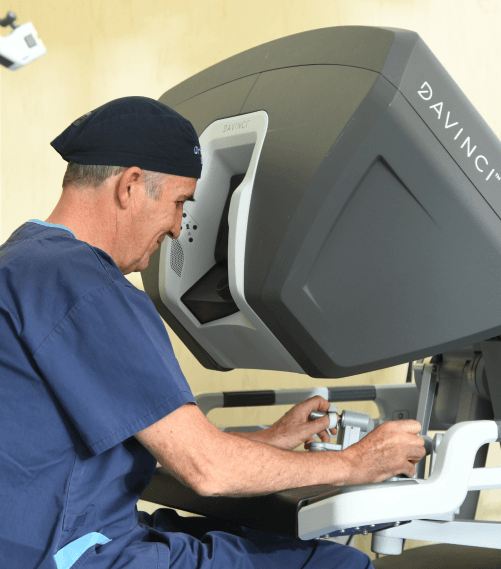Head and Neck Cancer and Surgery

What is Head and Neck Cancer?
Head and neck cancer consists of a range of different cancers originating from the head and neck.
Head and neck cancer includes:
- Cancer of the oral cavity (mouth)
- Cancer of the throat (oropharynx, hypopharynx, nasopharynx)
- Cancer of the larynx (voice box)
- Salivary gland (parotid or submandibular gland) cancers
- Thyroid cancer
- Head and neck skin cancers
- Cancers of the nose or sinuses
- Cancer in neck nodes
Cancers that originate from other parts of the head and neck such as the brain and eye, are not typically included in the classification of head and neck cancer.

What causes Head and Neck Cancer?
Head and neck cancer often originates in cell tissue called squamous epithelium and is usually diagnosed in patients over 40 years old. These cancers are also more common in men than in women.
It is not generally known why a person gets cancer, however, there are several factors which can increase the chances of developing the condition. These risk factors include:
- Use of tobacco – smoking, chewing or the use of snuff
- Excessive alcohol use
- Prolonged inhalation or other exposure to toxic chemicals or certain dust particles
- Infection with human papilloma virus (HPV) or Epstein-Barr virus (EBV)
What are the symptoms of Head and Neck Cancer?
Symptoms for head and neck cancer vary. If you notice any of the symptoms below, we advise contacting your local GP or Dr. Hall for a check-up. Symptoms to be aware of are:
- A lump in the neck
- Bleeding from the mouth or nose
- Difficulties with chewing, swallowing or opening the mouth
- Painful or blocked ear
- A sore that does not heal properly
- Lingering sore throat
- Hoarse voice, or speech difficulties
- A white or red patch in the mouth
- Painful jaw or loose teeth
- Pain or numbness in the face

Please bear in mind that if you are experiencing any of these symptoms, it does not necessarily mean that you have cancer. However, any persistent symptom should always be checked by your family doctor. You may later be referred to a head and neck surgical oncology specialist like Dr. Francis Hall to proceed with next steps in your diagnosis.
How is Head and Neck Cancer treated?
The treatment of head and neck cancer depends on the location of the cancer and if it has spread. Treatments are often carried out by a head and neck surgical oncology specialist. If there is an obvious lump, an ultrasound guided biopsy (FNA) is conducted to help differentiate between benign (non cancerous) lumps and malignant (cancerous) lumps. A biopsy is a minor procedure, which uses a thin needle to obtain cells from a lump which is then sent to a laboratory for testing. If the results show that the lump is cancerous, head and neck surgery may be required and is often combined with radiation and/or chemotherapy.
All patients with head and neck cancer benefit from a thorough assessment including a detailed history and thorough examination including flexible endoscopy if required. Investigations such as ultrasound, ultrasound guided FNA, CT scan, MRI scan and PET CT scan may be performed. Once all the information is obtained, Dr Hall presents the information to the head and neck MDM (multidisciplinary meeting). The MDM is attended by radiologists, pathologists, surgeons, radiation oncologists and medical oncologists. All the investigations are reviewed and recommendations for treatment are made.
If surgery is recommended this usually involves both excision of the primary site of the cancer (for example the tonsil or a part of the tongue) and removal of lymph nodes from the neck on the same side. Please see the relevant sections on the website for details for each cancer. (thyroid, parotid, submandibular gland, throat cancer, TORS, cancer of the mouth, neck dissection, head and neck skin cancer).
Procedures such as neck surgery (dissection) is a common treatment to remove any cancerous cells found in the neck. This procedure consists of removing a group of lymph nodes in the neck. The lymph nodes in the neck are arranged in 6 areas called levels. Depending on the severity of your cancer condition, the surgery can either be comprehensive (lymph nodes from level 1-5 removed) or selective (the nodes from some of the levels are removed).
A neck dissection may either be:
1. Therapeutic – in situations where it is already known that there is cancer in one or more lymph nodes
2. Elective – where it is unknown if there is cancer in any of the lymph nodes. In this case the neck surgery is performed because there is a high chance that there is cancer in one or more lymph nodes. Elective neck surgery is performed as a form of precaution as small, microscopic deposits of cancer in a lymph node cannot be detected by scans.
Dr. Hall and Head and Neck surgeries
Dr. Hall has performed hundreds of head and neck surgeries for all types of head and neck cancers. His patient-centred approach ensures that his treatment plans are comprehensive and based on the latest treatment modalities. He is also fellowship trained in ENT head and neck cancer surgery and has worked as a cancer specialist for over twenty years including five years at Henry Ford Hospital in Detroit, USA.

